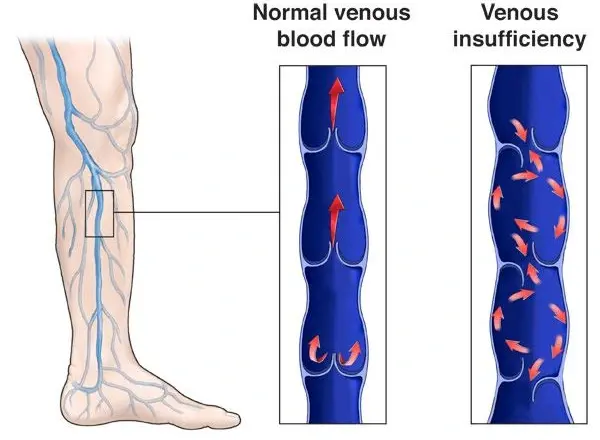Venous Diseases Treatment at DRHC Dubai
Venous diseases affect the veins that return deoxygenated blood from the body back to the heart. These conditions can range from mild discomfort to more severe health risks. At DRHC Dubai, our expert team of vascular specialists provides comprehensive care for a variety of venous conditions, ensuring accurate diagnosis and effective treatment.
Common Venous Diseases
Venous diseases encompass a range of conditions that affect the veins. The most common include:
- Varicose Veins: Enlarged, twisted veins, typically seen in the legs, caused by weak or damaged valves in the veins. They can lead to pain, swelling, and skin changes.
- Chronic Venous Insufficiency (CVI): A condition where the veins in the legs are unable to pump blood back to the heart properly, leading to swelling, skin changes, and venous ulcers.
- Deep Vein Thrombosis (DVT): A serious condition in which a blood clot forms in the deep veins, often in the legs. DVT can cause swelling, pain, and, if untreated, may lead to life-threatening complications like pulmonary embolism.
- Spider Veins: Small, dilated veins that appear close to the surface of the skin, resembling a spider web. Although usually harmless, they can be unsightly and cause discomfort.
- Superficial Thrombophlebitis: Inflammation of a vein near the surface of the skin, usually accompanied by a blood clot. It typically affects the legs and can cause redness, swelling, and pain.
- Leg Ulcers: Open sores that develop on the skin, often as a result of CVI. They are slow to heal and can lead to more serious infections if not properly treated.
Symptoms of Venous Diseases
Common Symptoms of Diseases
- Swelling in the legs or ankles
- Pain or aching in the legs, especially after prolonged sitting or standing
- Visible veins (varicose or spider veins)
- Heaviness or tiredness in the legs
- Skin changes, such as discoloration or hardening
- Itching or irritation around the affected veins
- Non-healing leg ulcers
Risk Factors for Venous Diseases
Several factors can increase the likelihood of developing venous diseases:
- Age: As you age, your veins may weaken.
- Gender: Women are more prone to venous diseases due to hormonal factors, pregnancy, and menopause.
- Prolonged standing or sitting: Occupations that require extended periods of standing or sitting can lead to poor blood flow in the legs.
- Obesity: Excess weight puts additional pressure on the veins.
- Family History: A family history of venous diseases increases the risk.
- Pregnancy: The increased blood volume and pressure on veins during pregnancy can lead to varicose veins.
- Smoking: Smoking can damage blood vessels and worsen venous conditions.
Diagnosis of Venous Diseases
At DRHC Dubai, we utilize advanced diagnostic tools to accurately assess venous diseases. Diagnostic techniques include:
- Duplex Ultrasound: A non-invasive test that uses sound waves to visualize blood flow and detect any blockages or abnormalities in the veins.
- Venography: A contrast dye is injected into the veins to create detailed X-ray images, allowing for a precise diagnosis of any blockages or clots.
Treatment Options for Venous Diseases
DRHC Dubai offers a range of cutting-edge treatments to manage venous diseases. The choice of treatment depends on the specific condition and its severity. Options include:
- Lifestyle Modifications: For mild cases, weight management, exercise, and leg elevation can help improve blood flow and reduce symptoms.
- Compression Therapy: Compression stockings can help support the veins and improve blood circulation, particularly in cases of varicose veins and CVI.
- Sclerotherapy: A minimally invasive procedure where a solution is injected into the affected veins, causing them to collapse and fade over time. It is effective for both spider veins and small varicose veins.
- Endovenous Laser Treatment (EVLT): A laser is used to heat and close off problematic veins. This procedure is commonly used for larger varicose veins and offers a minimally invasive alternative to traditional surgery.
- Radiofrequency Ablation: A catheter delivers radiofrequency energy to the vein walls, causing them to collapse and seal shut. This is often used for larger varicose veins.
- Vein Stripping and Ligation: In more severe cases, surgical removal of the problematic veins may be necessary. This procedure involves tying off and removing the damaged veins to improve circulation.
- Thrombectomy: In cases of DVT, a thrombectomy may be performed to remove blood clots from the deep veins.
- Venous Ulcer Care: Treatment involves wound care, compression therapy, and in some cases, surgery to improve blood flow and promote healing.
Why Choose DRHC Dubai for Venous Diseases Treatment?
- Expert Team: Our highly experienced vascular specialists are dedicated to providing personalized care for each patient.
- State-of-the-Art Technology: DRHC Dubai is equipped with the latest diagnostic and therapeutic tools to ensure effective treatment of venous diseases.
- Comprehensive Care: From lifestyle advice and non-invasive treatments to advanced surgical options, we offer a full spectrum of care tailored to your needs.
- Patient-Centered Approach: We prioritize patient comfort and safety, ensuring that each treatment plan is customized for optimal outcomes.
Preventing Venous Diseases
While some venous conditions cannot be entirely prevented, adopting healthy habits can significantly reduce the risk:
- Exercise Regularly: Physical activity promotes healthy circulation and reduces the risk of venous problems.
- Avoid Prolonged Sitting or Standing: If your job requires long periods in one position, try to take breaks to move around and stretch.
- Maintain a Healthy Weight: Reducing excess weight can lower pressure on the veins.
- Wear Compression Stockings: If you're at risk for venous diseases, wearing compression stockings can improve blood flow.
- Stay Hydrated and Eat a Balanced Diet: Proper hydration and nutrition support overall vascular health.
.png?width=281&height=59&name=bookanappointment%20(1).png)
At DRHC Dubai, we are dedicated to providing the highest level of care for patients with vascular conditions. To learn more about our services or to schedule a consultation with one of our vascular specialists, please contact us today at +97142798200. We are here to help you achieve optimal vascular health


.webp)

.png?width=281&height=59&name=bookanappointment%20(1).png)




